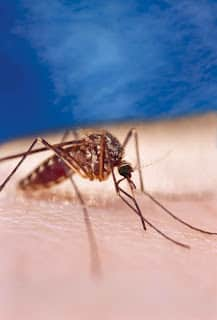Be Weary of Insect-Borne Diseases Outdoors
Jim Foster 10.20.12

Spending time in the outdoors is a rewarding and uplifting experience as well as being a lot of fun. However, today just being outside can lead to a health-threatening situation. The reason is the recent upsurge of the dreaded West Nile virus and the triple E virus. What is happening this year to increase the risks of these insect-borne diseases?
According to the CDC, as of September 25, 2012, 48 states have reported West Nile virus infections in people, birds, or mosquitoes. A total of 3,545 cases of West Nile virus disease in people, including 147 deaths, have been reported.

 experts explain this phenomenon is due to the incredibly warm winter, which led into an early spring and now extremely hot summer. These conditions have created excellent conditions for mosquito breeding, increasing the rates of West Nile throughout the country, with the highest rates in Texas, Mississippi and Oklahoma. As of this writing other states have reported West Nile cases, for example, Idaho.
experts explain this phenomenon is due to the incredibly warm winter, which led into an early spring and now extremely hot summer. These conditions have created excellent conditions for mosquito breeding, increasing the rates of West Nile throughout the country, with the highest rates in Texas, Mississippi and Oklahoma. As of this writing other states have reported West Nile cases, for example, Idaho.
Approximately 1 in 5 people who are infected with West Nile virus will develop symptoms such as fever, headache, body aches, joint pains, vomiting, diarrhea, or rash. Less than 1 percent will develop a serious neurologic illness such as encephalitis or meningitis (inflammation of the brain or surrounding tissues).
About 10 percent of people who develop neurologic infection due to West Nile virus will die. People over 50 years of age and those with certain medical conditions, such as cancer, diabetes, hypertension, kidney disease, and organ transplants, are at greater risk for serious illness.
Here are a few tips to help avoid biting insects;
- Water: Eliminate standing water, which acts as a breeding ground for mosquitoes. (Flowerpots, children’s pools, watering cans, gutters etc.) This is especially important during drought conditions.
- Trash: Remember to keep the lids on trashcans to keep out the rain.
- Puddles: Cover up or fill in low places in your yard where puddles can develop.
- Gutters: Keep gutters cleaned out so water does not build up inside and become a mosquito breeding ground.
- Drains: Make sure all drains on your property are also cleaned out without leaves blocking them up so water can drain effectively.
- Pipes: Repair leaky pipes and outdoor faucets.
- Toys: Empty plastic wading pools at least once a week or store in a position that water will drain.
- Pools: Make sure your backyard pool is maintained properly.
- Holes: Fill in tree rot holes and hollow stumps that hold water with sand or concrete.
- Bird Baths & Planters: Change water in birdbaths and planter pots or drip trays at least once a week.
- Grass: Keep grass cut short around the house, so adult mosquitoes will not hide there.
A small item of Insect Shield clothing provides less repellency than a larger one. You may need to adjust the amount of Insect Shield apparel you wear, depending on the number of biting insects that are present.
Topical repellent can be used for exposed skin, and is especially recommended for heavily infested locations.
If you have comments or news for Jim, his email is JimF06@gmail.com.


